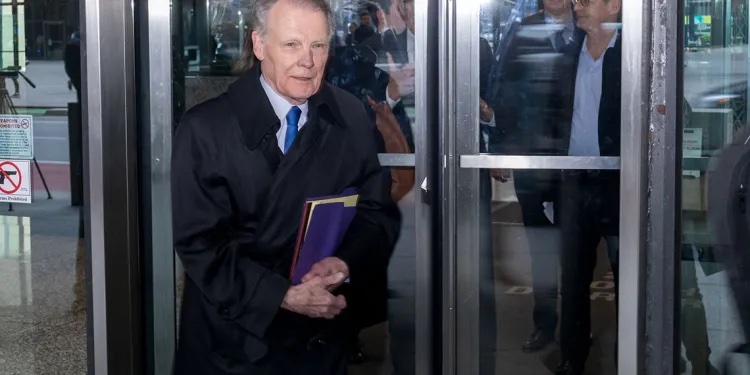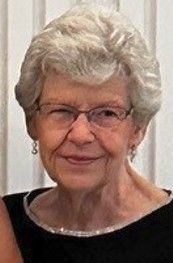Former Madigan aide testifies speaker had conflict of interest protocols

CHICAGO – After more than two weeks off from the federal corruption trial of former Illinois House Speaker Michael Madigan, the jury returned to the courtroom Monday for what’s expected to be the final few days of defense witnesses before closing arguments.
Attorneys for Madigan and his co-defendant, longtime Springfield lobbyist Mike McClain, have called several witnesses that had already been called by the government in a series of related trials in the leadup to Madigan’s. On Monday, that included Craig Willert, a former top staffer in the speaker’s office. Earlier in trial, his voice was projected into the courtroom on the other end of a wiretapped call with McClain, who explained that his lobbying success was due to considering Madigan his client.
Read more: ‘My client is the speaker’: Jury hears wiretapped calls of Madigan co-defendant, longtime friend | Madigan co-defendant had unparalleled access to speaker, ex-top aide testifies
The feds then called Willert’s mentor, longtime Madigan aide Will Cousineau, to the stand for hours of questioning, including about the lead-up to a late 2016 vote on the Future Energy Jobs Act. FEJA is one of the key bills the feds allege passed through Springfield as a result of electric utility Commonwealth Edison’s alleged bribes in the form of jobs and contracts to the speaker’s allies.
In late October, Cousineau testified that he’d informed Madigan that the bill, which top House Democratic lawyers had been negotiating for months, did not have enough support to pass. In response, Cousineau said Madigan instructed him to “work the bill.”
But Willert’s recollection of the weeks leading up to the Dec. 1, 2016, vote on FEJA were far less cloak-and-dagger than the feds’ version of events. Willert testified that he and the staffers he supervised had never surveyed the caucus about their intended votes. Instead, he said, they were told to instruct certain politically vulnerable House Democrats to vote against the bill.
Asked if Cousineau gave him a directive to encourage certain members to vote for FEJA in November 2016, Willert said he was “quite certain” he had not put together a roll call after searching his records pursuant to the defense attorneys’ subpoena.
“It’s the opposite,” Madigan attorney Dan Collins said. “He gave you a directive to go out and tell people to vote no.”
Willert agreed, having read aloud to the jury old text messages between himself and Cousineau about the members who should be kept off the bill. Willert also read text messages between himself and other staffers instructing them to call those members to confirm they’d be voting against FEJA.
On cross-examination, however, Assistant U.S. Attorney Julia Schwartz asked Willert if the speaker’s office had other ways to determine how members intended to vote on a bill other than doing their own roll call survey. One of the ways, Willert acknowledged, was from speaking to lobbyists who kept their own roll call.
“Fair to say you don’t have personal knowledge of every conversation Will Cousineau had with Mike Madigan about the FEJA vote?” Schwartz asked.
“Correct,” Willert replied.
“You were not the only senior staff member having convos with members about the FEJA bill,” Schwartz said.
“Correct,” Willert answered.
‘Smart Grid’ law
Also on Monday, defense attorneys called another former Madigan staffer to the stand to testify about FEJA and other energy legislation. Justin Cox, who served as a lawyer in Madigan’s office for more than a decade, followed his predecessor Dave Ellis, whose testimony began before the long holiday break but wrapped up on Monday.
Ellis, a judge in Illinois’ 1st District Appellate Court, had previously testified that he and Cox made major demands of ComEd during 2011 negotiations over what became known as the “Smart Grid” law. The law changed the way state regulators determined electric utility rates – a change ComEd wanted – but the “formula rate” system would be voided if the utility failed to make the investments it had committed to or create the jobs it claimed it would.
Read more: Madigan corruption trial breaks for holidays amid defense case
Additionally, ComEd had to agree to an automatic expiration of the formula rate, concessions that both Ellis and Cox said were non-negotiable.
Assistant U.S. Attorney Sarah Streicker on Tuesday asked Ellis if he was loyal to Madigan during his time in the speaker’s office.
“Was I loyal?” Ellis scoffed, having earlier affirmed that his “one and only condition” of taking the job as chief counsel was that he didn’t want to do the political work many Madigan staffers did during campaign season. “I did my job.”
Like Ellis, Cox said the fact that negotiations over the 2011 Smart Grid law took place in the speaker’s suite of offices in the Capitol was no indication that Madigan supported the bill.
“Um no, it was just a conference room,” Cox said, also affirming the same was true of negotiations FEJA in 2016.
Streicker asked both Ellis and Cox if they were aware the Smart Grid law was worth “hundreds of millions of dollars” to ComEd but both denied knowing that at the time.
Cox also emphasized that negotiations on both laws included many more parties than just the speaker’s office and ComEd, saying that Senate Democrats were “heavily involved” in addition to environmental and business groups. Both laws received bipartisan votes.
Additionally, Cox said, then-Gov. Bruce Rauner’s involvement in the final weeks of FEJA were critical.
“Without the governor’s support I’m not sure it would’ve passed,” Cox said.
Former law partner to testify
Madigan attorney Todd Pugh also used Cox’s testimony to introduce the jury to a practice defense attorneys will focus on during Tuesday’s questioning of former Madigan law partner Vincent “Bud” Getzendanner.
Cox testified that he’d meet with Getzendanner and the speaker “usually twice a year” to go over the firm’s client list “so I’d be aware if there was a potential conflict” that would necessitate a recusal.
In 2017 and 2018, Madigan tried to help Chicago alderman-turned-FBI mole Danny Solis in his efforts to get a parcel of land owned by the state transferred to the city of Chicago so it could be bought by developers. The developers were interested in turning part of a parking lot in Chicago’s Chinatown neighborhood into a mixed-use apartment complex and Madigan assigned McClain, who’d recently retired from lobbying, to help Solis on the project.
The feds allege Madigan helped Solis in order to get the property tax appeals work business from the developers. Madigan’s attorneys have pointed out Solis never directly offered to refer the business to Madigan until nine months after he first sought the speaker’s help on the land transfer.
The jury already heard extensive testimony last month on the ultimately failed effort, including a wiretapped call from late May 2018 in which McClain told Cox that the speaker should not vote on the bill because it involved “a developer of his.”
But Cox testified that whatever McClain meant by that – which he said was unclear – it was ultimately moot because the speaker never voted on land transfer bills even if they dealt with property far from Chicago.
“He would not vote on land transfer bills just to prevent any question of ‘was there a conflict here?’” Cox said. “And that wouldn’t just be for properties in Cook County area, that would be for properties all across the state.”
Getzendanner will be called on Tuesday and asked about those meetings after Collins argued they were essential for the jury to hear.
“This goes to the heart of why Mr. Madigan felt comfortable giving advice on the Chinatown Project,” Collins said. “Because he knew he was never going to take this business.”
Capitol News Illinois is a nonprofit, nonpartisan news service that distributes state government coverage to hundreds of news outlets statewide. It is funded primarily by the Illinois Press Foundation and the Robert R. McCormick Foundation.
This article first appeared on Capitol News Illinois and is republished here under a Creative Commons license.
Miss Clipping Out Stories to Save for Later?
Click the Purchase Story button below to order a print of this story. We will print it for you on matte photo paper to keep forever.

